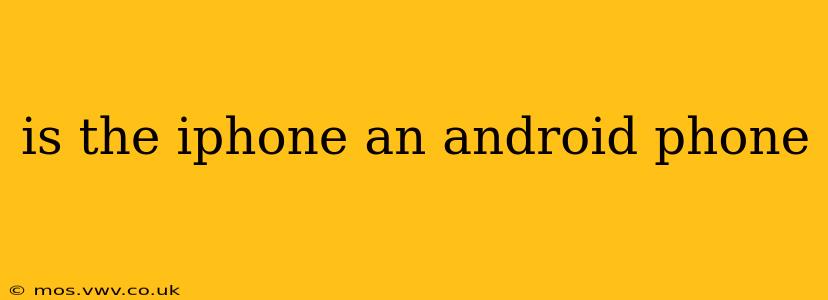No, the iPhone is not an Android phone. This is a fundamental distinction in the mobile phone market. While both iPhones and Android phones are smartphones offering similar functionalities, they operate on entirely different operating systems and are manufactured by separate companies.
Let's delve deeper into the key differences to understand why this is so important:
What is an Android Phone?
Android is an open-source operating system (OS) developed by Google. This means that the source code is publicly available, allowing various manufacturers like Samsung, Google (Pixel phones), OnePlus, and many others to customize and utilize it for their own devices. This leads to a wide variety of Android phones available, each with its own unique features and designs. The flexibility of Android allows for significant customization by both manufacturers and users.
What is an iPhone?
An iPhone, on the other hand, runs on iOS, a proprietary operating system developed and exclusively used by Apple. Apple designs its own hardware and software, resulting in a tightly integrated ecosystem. This means that Apple has complete control over every aspect of the iPhone's design, features, and performance. iOS is known for its user-friendliness and seamless integration with other Apple products.
Key Differences: Operating System and Ecosystem
The core difference lies in their operating systems:
- Android: Open-source, highly customizable, used by numerous manufacturers.
- iOS: Proprietary, closed-source, exclusively used by Apple.
This fundamental difference extends to the entire user experience. The app ecosystems are distinct, with apps optimized for either iOS or Android. While many apps are available on both platforms, the user interface and functionality might differ slightly. Furthermore, the overall user experience, from app design to system settings, is markedly different between iOS and Android.
What are the advantages of each?
Choosing between iOS and Android often comes down to personal preference.
Android Advantages:
- Customization: High degree of customization of the interface and features.
- Variety: Wide range of price points and device options from various manufacturers.
- Open Source: Allows for more flexibility and development opportunities.
iOS Advantages:
- User-Friendliness: Generally considered easier to use and navigate, particularly for beginners.
- Security: Known for strong security and privacy features.
- Seamless Integration: Works seamlessly with other Apple devices.
Are there any similarities between iPhones and Android phones?
Despite their core differences, iPhones and Android phones share some similarities:
- Basic Functionality: Both offer core smartphone functionalities like calling, texting, internet access, and app usage.
- App Stores: Both platforms have app stores where users can download and install applications.
- Multimedia Capabilities: Both support various multimedia functionalities like taking photos, videos, and listening to music.
In conclusion, while both serve the same general purpose, the iPhone and Android phones are fundamentally different devices based on their operating systems, ecosystems, and overall user experiences. The choice between them depends entirely on individual needs and preferences.
